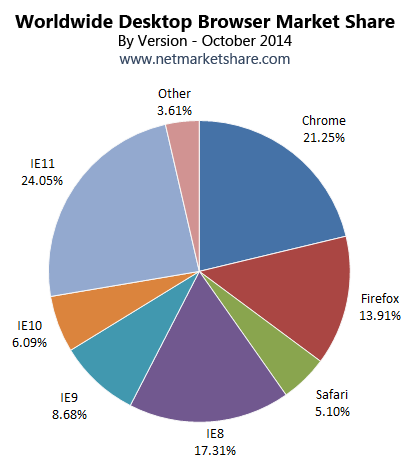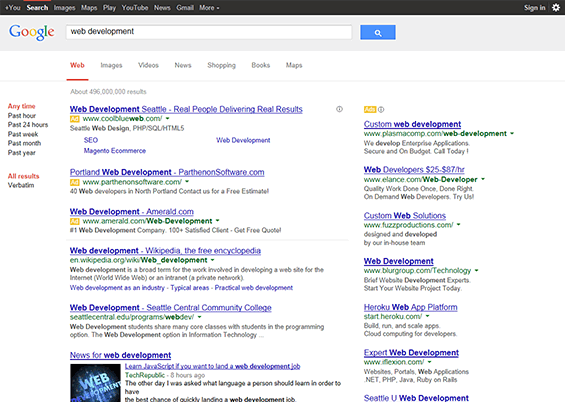Archive
This post is archived and may contain outdated information. It has been set to 'noindex' and should stop showing up in search results.
This post is archived and may contain outdated information. It has been set to 'noindex' and should stop showing up in search results.
Should Your New Website Support Internet Explorer 8 In 2015?
Nov 26, 2014Web DevelopmentComments (0)
It's almost 2015. Should you still test and make sure your new website functions properly all the way back to Internet Explorer 8? Or should you forgo older browsers and not care if your site is unusable on them?
The answer depends on your market and the types of users that will be accessing your website. It also depends on the expected functionality and complexity of the site. Here are some important things to consider when deciding if you should build an IE8-accessible website.
Consider where users will be accessing your website from. In developing countries that are only recently gaining Internet access, Internet Explorer 8 is a very commonly-used browser. It is the last browser upgrade available for Windows XP, and there are many cheap, old Windows XP machines out there. According to NetMarketShare, IE8 has 17.31% of the global market share.

NetMarketShare's data does not represent the western world's web traffic. It rather gives us a good look at the global population of people that are able to access the Internet on an individual basis, and what browser they use to do so. It is based on unique visitors and not hit traffic.
The largest user of IE8 is China (they also use IE6 heavily). If your website is only in English, you will probably only see a small, single-digit percentage for IE8 traffic. But if you offer translations that include a Chinese language, you probably should support IE8.
It can be difficult for companies to replace their old XP computers. They often have licensed software loaded (point-of-sale, inventory, etc) that could be troublesome to transfer to a new computer. They may also have network connections and hardware that other computers rely on, such as printers and scanners. Replacing an XP computer at a company will be more expensive than just the price of a new computer, due to the labor involved.
Smaller companies may not have an IT person on site and could balk at the per-hour cost to have someone come in to replace and configure computers. From my experience, many XP machines stay in service until they finally burn up or become too unbearably slow.
If your website will see traffic from inside your company and your company continues to use XP machines, your website should remain functional on IE8. If your website serves the automotive, marine, and other industries, you will probably need to have an IE8-functional website as well.
If your website is a simple portfolio, blog, or informational company site, you should be able to support IE8 without too much trouble, and doing so will probably be beneficial. Building a website that has simple and semantic markup, without relying on new and experimental features for basic functionality, will fare better on all platforms, not just old ones.
If you follow the principle of progressive enhancement from the start, your website will be able to function on the widest range of platforms and browsers, without spending a lot of development time on fixes, polyfills, and fallbacks.
If your website relies on modern features for its core functionality, then you should probably not support IE8. Websites like Google Apps do not need to support older browsers. They rely on modern features and functionality, and supporting older browsers would hold them back.
You may want to not support IE8 so that you can help move people towards newer browsers in order to benefit the web as a whole. As altruistic as this may be, you might be shooting yourself in the foot and alienating a not insignificant percentage of visitors. Can you afford to send people to your IE8-supporting competition, if you have any? Does your website contain content that a user will go out of their way to upgrade in order to access? Probably not.
If your website does not function on IE8 and you are not a vital service that people rely on, you will lose those visitors guaranteed. They will become frustrated with your brand and go to a different website. Perhaps they will upgrade one day, but it will not be your website that gets them to do so. It will take a vital service, such as Google.com, to stop functioning well in order to force users to upgrade.
So as long as Google.com works on IE8 so should your website. That is as long as your website doesn't have modern feature requirements.

Google.com on IE8
If your website is not too complex and you have the technical ability to do so, support as many browsers as you can, including IE8. You might be surprised what parts of the world you see traffic from, if your website functions on older computers.
To support older platforms, use progressive enhancement to start with a widely-functional simple website, which gains enhancements and features on modern browsers (CSS shadows, transitions, gradients, etc). Learn more here.
If your website relies on modern features for its core functionality, you probably should not support IE8.
The answer depends on your market and the types of users that will be accessing your website. It also depends on the expected functionality and complexity of the site. Here are some important things to consider when deciding if you should build an IE8-accessible website.
Emerging Web Markets
Consider where users will be accessing your website from. In developing countries that are only recently gaining Internet access, Internet Explorer 8 is a very commonly-used browser. It is the last browser upgrade available for Windows XP, and there are many cheap, old Windows XP machines out there. According to NetMarketShare, IE8 has 17.31% of the global market share.

NetMarketShare's data does not represent the western world's web traffic. It rather gives us a good look at the global population of people that are able to access the Internet on an individual basis, and what browser they use to do so. It is based on unique visitors and not hit traffic.
The largest user of IE8 is China (they also use IE6 heavily). If your website is only in English, you will probably only see a small, single-digit percentage for IE8 traffic. But if you offer translations that include a Chinese language, you probably should support IE8.
Legacy Company Hardware
It can be difficult for companies to replace their old XP computers. They often have licensed software loaded (point-of-sale, inventory, etc) that could be troublesome to transfer to a new computer. They may also have network connections and hardware that other computers rely on, such as printers and scanners. Replacing an XP computer at a company will be more expensive than just the price of a new computer, due to the labor involved.
Smaller companies may not have an IT person on site and could balk at the per-hour cost to have someone come in to replace and configure computers. From my experience, many XP machines stay in service until they finally burn up or become too unbearably slow.
If your website will see traffic from inside your company and your company continues to use XP machines, your website should remain functional on IE8. If your website serves the automotive, marine, and other industries, you will probably need to have an IE8-functional website as well.
Website Complexity
If your website is a simple portfolio, blog, or informational company site, you should be able to support IE8 without too much trouble, and doing so will probably be beneficial. Building a website that has simple and semantic markup, without relying on new and experimental features for basic functionality, will fare better on all platforms, not just old ones.
If you follow the principle of progressive enhancement from the start, your website will be able to function on the widest range of platforms and browsers, without spending a lot of development time on fixes, polyfills, and fallbacks.
If your website relies on modern features for its core functionality, then you should probably not support IE8. Websites like Google Apps do not need to support older browsers. They rely on modern features and functionality, and supporting older browsers would hold them back.
Forcing People To Upgrade
You may want to not support IE8 so that you can help move people towards newer browsers in order to benefit the web as a whole. As altruistic as this may be, you might be shooting yourself in the foot and alienating a not insignificant percentage of visitors. Can you afford to send people to your IE8-supporting competition, if you have any? Does your website contain content that a user will go out of their way to upgrade in order to access? Probably not.
If your website does not function on IE8 and you are not a vital service that people rely on, you will lose those visitors guaranteed. They will become frustrated with your brand and go to a different website. Perhaps they will upgrade one day, but it will not be your website that gets them to do so. It will take a vital service, such as Google.com, to stop functioning well in order to force users to upgrade.
So as long as Google.com works on IE8 so should your website. That is as long as your website doesn't have modern feature requirements.

Google.com on IE8
Summary
If your website is not too complex and you have the technical ability to do so, support as many browsers as you can, including IE8. You might be surprised what parts of the world you see traffic from, if your website functions on older computers.
To support older platforms, use progressive enhancement to start with a widely-functional simple website, which gains enhancements and features on modern browsers (CSS shadows, transitions, gradients, etc). Learn more here.
If your website relies on modern features for its core functionality, you probably should not support IE8.